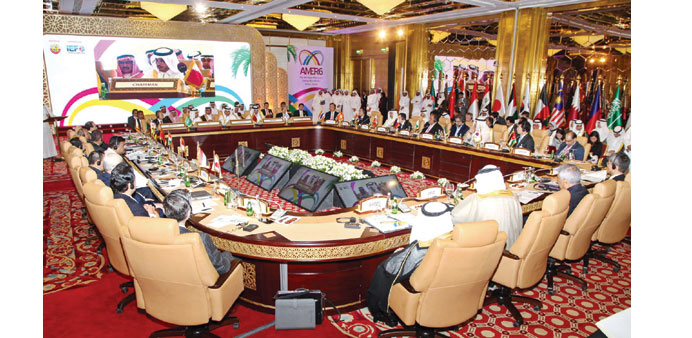Ministers and senior officials from some of the 30 largest energy producers and consumers in Asia took part in the two-day 6th Asian Ministerial Energy Roundtable that concluded at the Sheraton Doha yesterday.
Reuters
Doha
Long-term oil market fundamentals remain robust but prolonged low prices could threaten security of supply and pave the way for a price spike, Saudi Arabia’s vice oil minister said yesterday.
The world’s largest crude exporter will continue investing in its oil and gas sector, Prince Abdulaziz bin Salman said in a speech at an Asian energy conference in Doha.
“Supply and demand patterns indicate that the long-term fundamentals of the oil complex remain robust,” he said.
The comments suggest Saudi Arabia is satisfied with its strategy of not cutting production and allowing low prices to reduce supplies, without losing market share to competitors.
Oil prices, at around $47 a barrel, have more than halved since July 2014 on ample supplies.
The Organisation of the Petroleum Exporting Countries meets to review policy on December 4.
Two other Opec officials yesterday made upbeat comments about the 2016 outlook, suggesting big changes are unlikely.
Prince Abdulaziz said cuts in oil industry investment elsewhere in the world would lead to a drop in crude supplies from non-Opec countries in 2016 and beyond that was unlikely to be reversed.
Meanwhile, growth in demand fuelled mainly by Asia would remain strong, though slower than in the past.
“Non-Opec supply is expected to fall in 2016, only one year after the deep cuts in investment,” he said.
“Beyond 2016, the fall in non-Opec supply is likely to accelerate, as the cancellation and postponement of projects will start feeding into future supplies, and the impact of previous record investments on oil output starts to fade away.”
Prince Abdulaziz said a prolonged period of low oil prices was unsustainable, warning it could “reduce the resilience of the oil industry, undermining the future security of supply and setting the scene for another sharp price rise”.
“Just as the assertions, heard a few years ago - that the oil price would reach $200 a barrel - were proved wrong, so the recent assertion that the oil price has shifted to a new low structural equilibrium will also turn out to have been wrong.”
Oil companies around the world have deferred some $200bn worth of projects including complex, expensive ventures that hold huge resources, such as Canadian oil sands and deep water projects in Africa and southeast Asia.
But Saudi Arabia appears keen to send a message to the market that it is moving ahead with its oil and gas projects.
“As a responsible and reliable producer with a long-term horizon, the kingdom is committed to continue to invest in its oil and gas sector, despite the drop in the oil price,” Prince Abdulaziz said.
While Saudi Arabia sees a robust market over the long term, Opec has yet to complete a review of its long-term strategy as members disagree about the need to support a fair price and boost revenue, delegates say.
Opec governors - officials representing the member countries - met last week at the group’s Vienna headquarters to discuss the latest draft of the long-term strategy document.
“We have not yet finished, next year maybe,” said one delegate. “We need more time. It won’t be discussed at the conference in December.”
‘Oil market to be more balanced in 2016’
The oil market is expected to become more balanced in 2016 as demand continues to grow, Opec Secretary-General Abdullah al-Badri said yesterday ahead of the producer group’s policy meeting next month.
“The expectation is that the market will return to more balance in 2016,” he said in a speech at an Asian ministerial energy roundtable in Doha.
“We see global oil demand maintaining its recent healthy growth. We see less non-Opec supply. And we see an increase in the demand for Opec crude,” Badri said, according to the text of the speech published on the Opec website.
Most of the oil supply increases in recent years have come from high-cost production, Badri said, in a clear reference to supply sources such as US shale oil.
“The market is now taking on board this new reality and gradually resetting itself, as we can see with falling non-Opec supply growth and stronger demand,” he said.
The Organisation of the Petroleum Exporting Countries, which decided late last year to focus on maintaining market share instead of propping up oil prices, holds its next policy-setting meeting at its Vienna headquarters on December 4.
Saudi Arabia’s vice oil minister said yesterday that long-term oil market fundamentals remain robust but prolonged low prices could threaten security of supply and pave the way for a price spike.
The comments from Prince Abdulaziz bin Salman suggest the Opec heavyweight is satisfied with its strategy of not cutting production and allowing low prices to reduce supplies.

